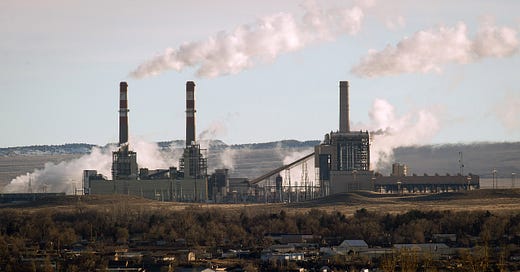We want our electricity to be inexpensive, reliable, & carbon free. Pick two.
— David Thielen1
The UCA2 is an intervener in the Xcel JTS proceeding, as they should be. The interesting question is, what should they be advocating for? Here’s their directive:
The UCA’s legislative directive is to represent the interests of residential, small business, and agricultural utility consumers before the Colorado Public Utilities Commission (PUC), focusing on ensuring fair rates, quality service, and equitable policies.
Nothing on carbon emissions. And eliminating GHG is expensive. We’ve been burning coal for a reason, it’s cheap, reliable, and provides major inertia to the grid. Replacing coal means:
Ensuring fair rates — rates will go up replacing coal.
Quality service — what will happen to quality depends on the replacement:
Equitable policies — some equitable issues improve, some get worse.5
Now granted, there’s also legislation that precludes coal so coal is out.6 But it’s interesting that the UCA should start from coal best meets their criteria and go from there.
Legislative Requirements
The legislative requirements on the power producers, and as such guiding the JTS is:
Colorado law mandates that utilities themselves must reduce greenhouse gas (GHG) emissions. Electric utilities must submit clean energy plans to achieve at least an 80% reduction in GHG emissions by 2030, relative to 2005 levels
Here’s where it gets interesting. This could probably be met by replacing coal with CCGT7 units. They need to reduce 80% from 2005. Well 35% wind/solar and 65% gas, with all coal taken offline, should be able to meet that goal. And if it comes up a little short, then use purchasing from out of state to get the final couple of percent.
This is unequivocally cheaper than wind & solar because wind & solar require gas backup for when the wind isn’t blowing and/or the sky is overcast (or it’s night). Even worse, the backup is SCGT instead of CCGT so you need more of them and they burn more gas. So 100%+ additional CAPEX and OPEX over just gas.
Nuclear?
I think there’s a lot of arguments for nuclear, assuming we can build at a decent price and timeline. However, I don’t think the advantages of nuclear beat gas for the UCAs criteria.
Nuclear’s advantages over gas are:
Zero carbon emission
Super reliable
Powerful inertia
But it does cost more than gas. So the UCA in its trade-offs might find the super reliable & inertia advantage over gas to be sufficient on their reliability criteria. But if I was making the decision as the Director of the UCA, I’d come down on the gas side.
So Wither Thou Go UCA?
If the UCA intervenes in favor of wind & solar — I’d sure like to hear how they justify that. While that’s the preference of the CEO, and I think the PUC, it does not meet the criteria of the UCA.
Someone else probably said this before me. But until I find it to be so, I’m claiming to be the originator of this.
Colorado office of the Utility Consumer Advocate.
Gas lines can freeze taking it offline. Provides weaker inertia.
Not dependable, even with batteries it hits limits. No inertia.
Removing coal makes the locations by the plants healthier (good) and eliminates a lot of good paying jobs (bad).
Unless they can find workable carbon capture and I am not aware of any existing solution that will work at scale.
Combined Cycle Gas Turbine





If coal and nuclear are out, the remaining choices are solar-wind/Simple Cycle Gas Turbine (fast response time but only 35-40% efficiency) or all CCGT (modern technology is 60+% efficiency). CCGT approach is cheaper and with the high efficiency should actually have lower CO2 emissions. Also avoids the low inertia risks now being recognized.